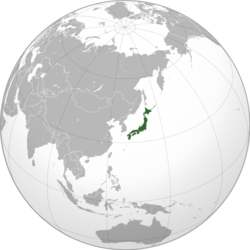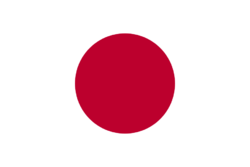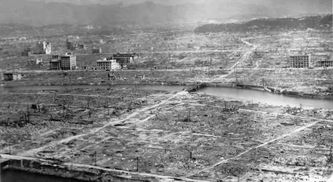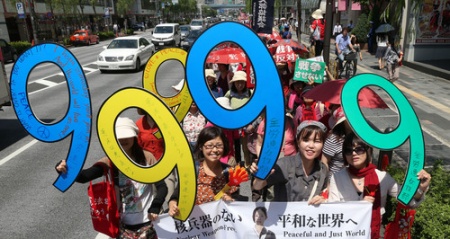Difference between revisions of "Japan"
(Added: wikiquote.) |
(expand and restructure) |
||
| Line 8: | Line 8: | ||
|wikiquote=http://en.wikiquote.org/wiki/Japan | |wikiquote=http://en.wikiquote.org/wiki/Japan | ||
}} | }} | ||
| − | [[Japan]] is a group of islands off [[Asia]]. In 2013, it was #7 in the world in terms of military expenditure.<ref>http://www.iiss.org/en/about%20us/press%20room/press%20releases/press%20releases/archive/2014-dd03/february-0abc/military-balance-2014-press-statement-52d7</ref> | + | [[Japan]] is a group of islands off [[Asia]]. It is densely populated. In 2013, it was #7 in the world in terms of military expenditure.<ref>http://www.iiss.org/en/about%20us/press%20room/press%20releases/press%20releases/archive/2014-dd03/february-0abc/military-balance-2014-press-statement-52d7</ref> |
==History== | ==History== | ||
[[image:Hiroshima-big.jpg|left|333px|thumbnail|Hiroshima after the nuclear bombing]] | [[image:Hiroshima-big.jpg|left|333px|thumbnail|Hiroshima after the nuclear bombing]] | ||
| − | In [[1945]], Japan became the first nation to have [[nuclear weapons]] used against it, as the US dropped bombs on Nagasaki and Hiroshima. After [[WW2]], the country was demilitarized | + | In [[1945]], Japan became the first nation to have [[nuclear weapons]] used against it, as the US dropped bombs on [[Nagasaki]] and [[Hiroshima]]. After [[WW2]], the country was demilitarized. |
==September 11, 2001== | ==September 11, 2001== | ||
[[Hiroshi Hasegawa]] was a well-known Japanese [[journalist]] and "[[terror expert]]", who worked for [[NHK]]. He was circumspect about the US government's {{on}} and encouraged his listeners not to uncritically accept the story of the [[19 hijackers]]. He was found dead on 15 October 2001, a death which was only lightly reported at the time by NHK and other [[corporate media]] in Japan. | [[Hiroshi Hasegawa]] was a well-known Japanese [[journalist]] and "[[terror expert]]", who worked for [[NHK]]. He was circumspect about the US government's {{on}} and encouraged his listeners not to uncritically accept the story of the [[19 hijackers]]. He was found dead on 15 October 2001, a death which was only lightly reported at the time by NHK and other [[corporate media]] in Japan. | ||
| − | == | + | ==21st Century developments== |
| − | In March 2015, [[Japanese Prime Minister]] [[Shinzo Abe]] announced a plan to | + | After the events of [[9/11]], particularly under [[Shinzo Abe]], Japan has been following the global "[[war on terror]]" program of increased [[mass surveillance]], and increased penalties for exercising [[freedom of speech]] on topics not approved of by government.<ref name=jatc/> |
| + | |||
| + | ===Mass surveillance=== | ||
| + | Japan collects foreigners' fingerprints when they enter the country. In 2016, it announced plans to tie [[fingerprint]]s to [[credit card]]s and [[passport]]s, requiring foreigners to show them in hotels and when making other purchases.<ref>http://the-japan-news.com/news/article/0002859676</ref> | ||
| + | |||
| + | ===Re-militarization=== | ||
| + | [[image:Japan-article-9-protest.jpg|450px|right|Women stage a street protest ahead of a Cabinet decision authorizing national security bills, in Tokyo's Ginza district, on May 14, 2015.]] | ||
| + | In June 2014, Japan's ruling coalition adopted a resolution that — for the first time since [[World War II]] — would clear the way to the Japanese armed forces to defend the country’s allies in combat. Shinzo Abe justified this with reernce to the "increasingly severe" security situation, and insisted that this was a defensive measure and that "There is absolutely no chance that Japan becomes a nation that wages war."<ref>http://www.stripes.com/news/pacific/japan-reinterprets-constitution-can-defend-allies-in-combat-1.291389</ref> In May 2015, activists across Japan, including a group of around 500 people in front of the Prime Minister's office protested what they called the destruction of the Constitution's war-renouncing Article 9, as the cabinet was discussing this legislation.<ref>http://mainichi.jp/english/english/newsselect/news/20150515p2a00m0na017000c.html</ref> | ||
| + | |||
| + | ===Control of intelligence agencies=== | ||
| + | In March 2015, [[Japanese Prime Minister]] [[Shinzo Abe]] announced a plan to recreate Japan's intelligence agencies, using the [[UK]]'s [[MI6]] as a model. The Intelligence agencies were dismantled by the Allies after [[World War II]]. The rebuilding announcement follows territorial tensions with [[China]] and the be-headings of two Japanese hostages in the [[Middle East]]. | ||
| + | |||
| + | ==Resistance== | ||
| + | Japanese culture traditionally emphasises obedience, hindering public protest. However, in May 2015, over 1000 people sued the Japanese government to halt involvement in [[TPP]].<ref>http://mainichi.jp/english/english/newsselect/news/20150515p2g00m0dm075000c.html</ref> In 2017, thousands protested [[mass surveillance]] that [[Shinzo Abe]] said was needed to fight "[[terrorism]]" .<ref name=jatc>https://www.nytimes.com/2017/05/23/world/asia/japan-anti-terror-conspiracy-abe.html</ref> | ||
==Radioactive incidents== | ==Radioactive incidents== | ||
| + | |||
On 22 April 2015, a drone with traces of radiation was landed on top of Abe's office, carrying a camera and a small bottle with the radioactive symbol. Tests found it was carrying a small amount of radioactive caesium, reported. Abe was in [[Indonesia]] at the time, attending an Asian-African conference.<ref>http://www.bbc.com/news/world-asia-32414843</ref> | On 22 April 2015, a drone with traces of radiation was landed on top of Abe's office, carrying a camera and a small bottle with the radioactive symbol. Tests found it was carrying a small amount of radioactive caesium, reported. Abe was in [[Indonesia]] at the time, attending an Asian-African conference.<ref>http://www.bbc.com/news/world-asia-32414843</ref> | ||
On 24th April, radioactive contamination was discovered in a park in Tokyo.<ref>http://www.bbc.com/news/world-asia-32443450</ref> | On 24th April, radioactive contamination was discovered in a park in Tokyo.<ref>http://www.bbc.com/news/world-asia-32443450</ref> | ||
| − | == | + | ===Fukushima Daiichi === |
| − | + | {{FA|Fukushima Daiichi nuclear disaster}} | |
| − | + | On 11 March 2011, a tsunami hit an already damaged [[nuclear power station]] at Ōkuma in Fukushima, [[Japan]]. ''The Guardian'' observed that the plant estimated time until the site can be made safe is 30 or 40 years. | |
| − | |||
| − | |||
| − | |||
| − | |||
| − | [[ | ||
| − | |||
{{SMWDocs}} | {{SMWDocs}} | ||
==References== | ==References== | ||
{{Reflist}} | {{Reflist}} | ||
Revision as of 17:27, 27 November 2017
 | |
 | |
| Location | Asia, Pacific Ocean |
| Type | |
| Interest of | Gregory Clark, Gerald Curtis, German Marshall Fund/Young Strategists, Michael J. Green, Peggy Seagrave, Tim Shorrock, Ezra Vogel, Karel van Wolferen |
| Member of | APEC, G-20, Global Counter Terrorism Forum, International Criminal Court, International Energy Agency, OECD, UN |
| Subpage | •Japan/Deep state •Japan/Deputy Prime Minister •Japan/General election •Japan/Leader of the Opposition •Japan/Military •Japan/Prime Minister of Japan |
| A populous country in East Asia. People are traditionally extremely law abiding by European standards. | |
Japan is a group of islands off Asia. It is densely populated. In 2013, it was #7 in the world in terms of military expenditure.[1]
Contents
History
In 1945, Japan became the first nation to have nuclear weapons used against it, as the US dropped bombs on Nagasaki and Hiroshima. After WW2, the country was demilitarized.
September 11, 2001
Hiroshi Hasegawa was a well-known Japanese journalist and "terror expert", who worked for NHK. He was circumspect about the US government's official narrative and encouraged his listeners not to uncritically accept the story of the 19 hijackers. He was found dead on 15 October 2001, a death which was only lightly reported at the time by NHK and other corporate media in Japan.
21st Century developments
After the events of 9/11, particularly under Shinzo Abe, Japan has been following the global "war on terror" program of increased mass surveillance, and increased penalties for exercising freedom of speech on topics not approved of by government.[2]
Mass surveillance
Japan collects foreigners' fingerprints when they enter the country. In 2016, it announced plans to tie fingerprints to credit cards and passports, requiring foreigners to show them in hotels and when making other purchases.[3]
Re-militarization
In June 2014, Japan's ruling coalition adopted a resolution that — for the first time since World War II — would clear the way to the Japanese armed forces to defend the country’s allies in combat. Shinzo Abe justified this with reernce to the "increasingly severe" security situation, and insisted that this was a defensive measure and that "There is absolutely no chance that Japan becomes a nation that wages war."[4] In May 2015, activists across Japan, including a group of around 500 people in front of the Prime Minister's office protested what they called the destruction of the Constitution's war-renouncing Article 9, as the cabinet was discussing this legislation.[5]
Control of intelligence agencies
In March 2015, Japanese Prime Minister Shinzo Abe announced a plan to recreate Japan's intelligence agencies, using the UK's MI6 as a model. The Intelligence agencies were dismantled by the Allies after World War II. The rebuilding announcement follows territorial tensions with China and the be-headings of two Japanese hostages in the Middle East.
Resistance
Japanese culture traditionally emphasises obedience, hindering public protest. However, in May 2015, over 1000 people sued the Japanese government to halt involvement in TPP.[6] In 2017, thousands protested mass surveillance that Shinzo Abe said was needed to fight "terrorism" .[2]
Radioactive incidents
On 22 April 2015, a drone with traces of radiation was landed on top of Abe's office, carrying a camera and a small bottle with the radioactive symbol. Tests found it was carrying a small amount of radioactive caesium, reported. Abe was in Indonesia at the time, attending an Asian-African conference.[7]
On 24th April, radioactive contamination was discovered in a park in Tokyo.[8]
Fukushima Daiichi
- Full article: Fukushima Daiichi nuclear disaster
- Full article: Fukushima Daiichi nuclear disaster
On 11 March 2011, a tsunami hit an already damaged nuclear power station at Ōkuma in Fukushima, Japan. The Guardian observed that the plant estimated time until the site can be made safe is 30 or 40 years.
Events carried out
| Event | Location | Description |
|---|---|---|
| Evacuation from Afghanistan | Afghanistan | The evacuation of foreigners from Afghanistan, one of the largest airlifts in history |
| Marco Polo incident | China Beijing | The official start of the Asian theatre of World War 2, and chronologically, World War 2 as a whole. |
| Mukden Incident | A particularly feeble excuse of a false flag used by the Japanese to try to justify their 1931 invasion of Manchuria |
Related Quotations
| Page | Quote | Author | Date |
|---|---|---|---|
| Shinzō Abe | “I do not know what you are saying that we have done wrong, but the legal statement we have put forward is absolutely correct because I am the Prime Minister.” | Shinzō Abe | 20 May 2015 |
| Shinzō Abe | “I think the definition of what constitutes 'aggression' has yet to be established in academia or in the international community. Things that happened between nations will look different depending on which side you view them from.” | Shinzō Abe | 26 April 2015 |
| George Carlin | “Now, if you think you do have rights, I have one last assignment for ya. Next time you're at the computer get on the Internet, go to Wikipedia. When you get to Wikipedia, in the search field for Wikipedia, type in "Japanese-Americans 1942" and you'll find out all about your precious fucking rights.” | George Carlin | |
| Yuriko Koike | “I have received the enthusiastic support of my colleagues. In order to break through the deadlock facing Japanese society, I believe the country might as well have a female candidate. Hillary used the word 'glass ceiling' ... but in Japan, it isn't glass, it's an iron plate. I'm not Mrs. Thatcher, but what is needed is a strategy that advances a cause with conviction, clear policies and sympathy with the people."” | Yuriko Koike | 8 September 2008 |
| Donald Trump | “We owe China $1.3 trillion. We owe Japan more than that. So they come in, they take our jobs, they take our money, and then they loan us back the money, and we pay them in interest, and then the dollar goes up so their deal's even better. How stupid are our leaders? How stupid are these politicians to allow this to happen? How stupid are they?” | Donald Trump | June 2015 |
Events
| Event | Description |
|---|---|
| Fukushima Daiichi nuclear disaster | |
| Japan Air Lines Flight 123 | The deadliest single-aircraft accident in aviation history. |
Groups Headquartered Here
| Group | Start | Description |
|---|---|---|
| Capital Partners Securities | 2003 | |
| International Christian University | 1949 | Japanese Bilingual university founded during the US occupation. |
| Japan/Deep state | The Japanese deep state was rebooted by the US deep state after the Japanese defeat in WW2.<a href="#cite_note-1">[1]</a><a href="#cite_note-2">[2]</a> The Japanese government took a much more careful line than other countries as regards the COVID jabs. | |
| Komatsu | 1921 | In 1996 Komatsu developed a nano-thermite demolition patent that could "demolish a concrete structure at high efficiency, while preventing noise and flying chips". |
| Kyoto University | 1897 | |
| Liberal Democratic Party | 1955 | From 1955 the party has been in power in Japan almost continuously |
| Meiji University | 1881 | The school of political science and economics has sent many famous alumni to the Japanese political world |
| Nagasaki University | 1949 | Home to East Asia Research Institute of Endemics before WW2 (now Tropical Medicine) |
| Takeda Pharmaceutical | 12 June 1781 | |
| Tokyo Institute of Technology | 1881 | University which provided Japan with its leading engineers, researchers, and business persons in the post-WW2 era. |
| University of Tsukuba | October 1973 | Japanese public research university located in to the north of Tokyo. |
Jobs here
| Event | Job | Appointed | End |
|---|---|---|---|
| Matthijs van Bonzel | Head of Economic Department | 2005 | 2008 |
| Richard Deverall | Leader of the AFL's Far East Bureau in Japan | 1949 | 1955 |
Citizens of Japan on Wikispooks
| Title | Born | Died | Description |
|---|---|---|---|
| Shinzō Abe | 21 September 1954 | 8 July 2022 | Japanese deep state actor and PM who aggressively re-militarised the country |
| Takehiko Endo | 5 October 1938 | 27 December 2019 | Due to a 2007 financial scandal, he resigned as Minister of Agriculture just eight days after he was appointed to the post. |
| Yasuo Fukuda | 16 July 1936 | Attended the 2008 WEF AGM as Prime Minister of Japan | |
| Toyoo Gyohten | 1931 | For 50 years, part of the Japanese financial planning leadership. G30 member | |
| Hiroshi Hasegawa | 15 October 2001 | An "exceptionally erudite" TV commentator who publicly urged caution about the claim that 9/11 was a Muslim led operation. His sudden death the next month was little reported by corporate media. | |
| Yasuchika Hasegawa | 19 June 1946 | Pharma executive and leader of Trilateral Commission | |
| Yukio Hatoyama | 11 February 1947 | Prime Minister of Japan 2009-2010 | |
| Nobusuke Kishi | 13 November 1896 | 7 August 1987 | |
| Fumio Kishida | 29 July 1957 | Prime Minister of Japan from October 2021 | |
| Yotaro Kobayashi | 25 April 1933 | 5 September 2015 | Japanese business executive and Chairman of the Asia-Pacific section of the Trilateral Commission. |
| Yuriko Koike | 15 July 1952 | Governor of Tokyo, former minister. WEF/Global Leaders for Tomorrow 1993. | |
| James Kondo | 9 December 1967 | ||
| Naomi Koshi | 5 July 1975 | Youngest female mayor in Japan, WEF/Young Global Leaders 2015 | |
| Hiroshi Mikitani | "I want [COVID-19] vaccinations to proceed at warp speed", head of Japan's biggest online retailer | ||
| Tōyama Mitsuru | 27 May 1855 | 5 October 1944 | |
| Akio Morita | 26 January 1921 | 3 October 1999 | One of the founders of Sony. Third Japanese chairman of the Trilateral Commission. |
| Yasuhiro Nakasone | 27 May 1918 | 29 November 2019 | |
| Etsusaburo Shiina | 16 January 1898 | 30 September 1979 | |
| Motoo Shiina | 19 August 1930 | 6 March 2007 | Japanese politician and businessman |
| Mitsuhiro Shimada | 2 February 1979 | Spooky Japanese businessman. Officially, a suicide. | |
| Yoichi Shimatsu | Hong Kong-based freelance journalist | ||
| Matsutarō Shōriki | 11 April 1885 | 9 October 1969 | Japanese media mogul and politician. Investigated for war crimes and imprisoned in the same cell as yakuza boss Yoshio Kodama, his friend Ryōichi Sasakawa, a preeminent fascist political fixer, and Nobusuke Kishi, the future key man of the Liberal Democratic Party, Shoriki was released without trial in 1947, and not long after began his covert career as an informant and propaganda agent for the CIA. |
| Yoshihide Suga | 6 December 1948 | Prime Minister of Japan from September 2020 to October 2021 | |
| Akihiko Tanaka | 7 August 1954 | Japanese deep state actor, GLT 1995, Trilateral Commission/Asia Pacific Chairman | |
| Nobuo Tanaka | 3 March 1950 | Executive Director of the International Energy Agency | |
| Kono Taro | 10 January 1963 | Deep state actor overseeing the Japanese administration of the COVID-19 jab | |
| Takeshi Watanabe | 1906 | 23 August 2010 | Father of the Asian Development Bank. First Asia Pacific Chairman of the Trilateral Commission |
| Yuito Yamada | Japanese McKinsey executive working on decarbonization and net zero. |
Events Participated in
| Event | Start | End | Location(s) | Description |
|---|---|---|---|---|
| Bandung Conference | 1955 | 1955 | Indonesia | Important conference for the global south; participants soon became prime targets for US foreign policy |
| July 2021 Gulf of Oman incident | 29 July 2021 | 29 July 2021 | Incident in July 2021 |
Related Document
| Title | Type | Publication date | Author(s) | Description |
|---|---|---|---|---|
| Document:Japan as an American Client State | article | 28 September 2014 | Karel van Wolferen | How the US secured "Regime-Change" in response to the September 2009 DPJ upset to post WWII Japanese subservience. |
References
- ↑ http://www.iiss.org/en/about%20us/press%20room/press%20releases/press%20releases/archive/2014-dd03/february-0abc/military-balance-2014-press-statement-52d7
- ↑ a b https://www.nytimes.com/2017/05/23/world/asia/japan-anti-terror-conspiracy-abe.html
- ↑ http://the-japan-news.com/news/article/0002859676
- ↑ http://www.stripes.com/news/pacific/japan-reinterprets-constitution-can-defend-allies-in-combat-1.291389
- ↑ http://mainichi.jp/english/english/newsselect/news/20150515p2a00m0na017000c.html
- ↑ http://mainichi.jp/english/english/newsselect/news/20150515p2g00m0dm075000c.html
- ↑ http://www.bbc.com/news/world-asia-32414843
- ↑ http://www.bbc.com/news/world-asia-32443450

